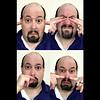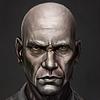Take a photo of a barcode or cover
I have been a long time fan of Asimov so I am surprised to say that I did not find Mr Niven's works till recently. Now I feel that I am so far behind that I must read a book a day to catch up on his body of work. It is a pure pleasure to see what he has dreamt up. The socio economic conditions described in this is just beyond imagining and so true. Looking forward to reading the rest of the books in his known space series.
I'm a sucker for Larry Niven and his Tales of Known Space stories, they were my first introduction to Sci-Fi all those many years ago. This is maybe not one of his best efforts, or maybe they have lost their gloss with time.
A lot of the parts that make up this story just don't seem to fit together very well. It's a story about a space colony on a mostly uninhabitable world; It's a story about a guy with a strange power that makes others forget about him; It's a story about an imbalance of power and a warped justice system that executes you for jaywalking to fill the organ banks. It also ends with an epilogue that has very little to do with the story that just unfolded. Despite this, there's lots of action and thought-provoking dialogs.
While containing many interesting ideas (automated scout robots to seek out inhabitable worlds, mercy weapons, telepathy, etc.) the overall novel felt dated and wasn't particularly gripping.
The bone of contention in the story are the organ banks which are used in this new human colony on a far off world to heal people and extend lifespans. Granted, these treatments aren't available to all classes of people and the means of securing the organic matter are pretty sus, but the banks themselves are made out to be this great inhuman amoral thing, which I didn't get at all. Reusing all organics for the benefit of those living makes perfect sense to me, especially in a lone colony setting. Like maybe it was a 60s thing and the idea was still new and grotesque to some? Hard to tell.
Regardless, the main character is irritating, not to mention pretty sexist, and I felt no sympathy for him. The pacing was weird too -- after the first half of the book I was pretty much looking forward to it ending. A weak 2/5.
The bone of contention in the story are the organ banks which are used in this new human colony on a far off world to heal people and extend lifespans. Granted, these treatments aren't available to all classes of people and the means of securing the organic matter are pretty sus, but the banks themselves are made out to be this great inhuman amoral thing, which I didn't get at all. Reusing all organics for the benefit of those living makes perfect sense to me, especially in a lone colony setting. Like maybe it was a 60s thing and the idea was still new and grotesque to some? Hard to tell.
Regardless, the main character is irritating, not to mention pretty sexist, and I felt no sympathy for him. The pacing was weird too -- after the first half of the book I was pretty much looking forward to it ending. A weak 2/5.
I was initially inclined to dock this book one star for its reliance on parapsychology. The plot here leans very heavily on the protagonist's psychic powers (specifically, a type of telekinesis) which acts as the book's perpetuum mobile. Matt Keller's psychic powers are so fundamental to this story that without them there would be no story to speak of. But then I realized that when this book was written -- during the late 1960s -- the jury was still out on the legitimacy of parapsychological research. At that time mainstream science still allowed for the reasonable possibility that a phenomenon such as telekinesis might exist; the willingness to test this hypothesis scientifically would, over the next few decades, debunk its validity, but in 1968 it was still considered a subject for serious scientific inquiry. Thus, I was able to discount my initial objection and enjoy this in the spirit it was written. For the most part.
Our knowledge of parapsychology is not the only thing that has changed in the intervening decades, after all. So, for example, Niven exhibits the sort of base-line sexism which was the norm 50 years ago. And while this may not have been perceived as a fault when the first edition of this novel was published, it is glaring from a present-day perspective. In addition, the idea that organ transplants would be so common as to result in the death penalty being applied to petty crimes in order to provide an organ harvest is far-fetched in any age. It implies a suspension of the basic morality without which any society would quickly descend into chaos. Organs for transplant are, indeed, in high demand in our present age, but it has not produced the massive state-funded organ banks which Niven portrays, let alone the butchering of miscreants who have accrued an overabundance of parking tickets.
In short, not bad, but no masterpiece. Niven has gone on to better things.
Our knowledge of parapsychology is not the only thing that has changed in the intervening decades, after all. So, for example, Niven exhibits the sort of base-line sexism which was the norm 50 years ago. And while this may not have been perceived as a fault when the first edition of this novel was published, it is glaring from a present-day perspective. In addition, the idea that organ transplants would be so common as to result in the death penalty being applied to petty crimes in order to provide an organ harvest is far-fetched in any age. It implies a suspension of the basic morality without which any society would quickly descend into chaos. Organs for transplant are, indeed, in high demand in our present age, but it has not produced the massive state-funded organ banks which Niven portrays, let alone the butchering of miscreants who have accrued an overabundance of parking tickets.
In short, not bad, but no masterpiece. Niven has gone on to better things.
I just didn't get with this one. Insecure idiot joins terrorist cell against a fascist state because he thinks a girl is hot, and he finds out he has really strong superpowers... Yeah, no. There was a cool section on the influence of technology on morality, though. The rest of it seems like an overlong exploration of Niven's short story: "The Jigsaw Man."
A Gift from Earth is set on a high plateau, basically the only habitable spot on a Venus-like planet. It was colonized by humans but the crew of the ship from Earth decided to change the original plan and make the colony a dictatorship with them in charge, and since the crew controls the hospital they set it up so that they harvest the organs of the common folks who are put to death for serious crimes. The crew are able to prolong their lives with these organs. A rebellion is the born amongst the citizens. The Sons of Earth have had it!
The plot centers around our protagonist, Matt Keller, who originally seems like an everyday fellow working as a miner. He discovers the weird feelings he's had his whole life are actually psychic powers. He can essentially make himself invisible. He and his magic powers end up being part of the rebellion against the crew and hijinks ensue.
I was mostly bored by this novel. The setting and premise were fairly interesting but the story didn't grab me at all. Matt's powers were too much like magic, less like science fiction. What's the point if he's able to essentially run around the place like a super hero? The plot really bogged down in places. I'm not going to knock it because of the era it was a product of (as is the custom these days), but it had all the trappings of something from 1968. This probably one of my least favorite novels of the New Wave of science fiction era.
The plot centers around our protagonist, Matt Keller, who originally seems like an everyday fellow working as a miner. He discovers the weird feelings he's had his whole life are actually psychic powers. He can essentially make himself invisible. He and his magic powers end up being part of the rebellion against the crew and hijinks ensue.
I was mostly bored by this novel. The setting and premise were fairly interesting but the story didn't grab me at all. Matt's powers were too much like magic, less like science fiction. What's the point if he's able to essentially run around the place like a super hero? The plot really bogged down in places. I'm not going to knock it because of the era it was a product of (as is the custom these days), but it had all the trappings of something from 1968. This probably one of my least favorite novels of the New Wave of science fiction era.
Larry Niven was my favorite author in my pre-teen and early teen years. Back in those days I read all of his pre-1980 work over and over again (aside from the novels The Magic Goes Away and Protector) and then I stopped. Though I did end up reading Footfall many years later, for about 30 years I gave little thought to reading any of his stuff.
A year ago though, bored with what I was reading and compelled by the cover of Juggler of Worlds, I ordered it from Powell's and read it. I then read three more modern novels of his in the year that followed (Fleet of Worlds, Building Harlequin's Moon and Beowulf's Children) and I would have to say that I generally enjoyed them (especially Fleet of Worlds) and that has led to an interest in re-reading all of his old books.
I started that process this week with A Gift From Earth, which I recalled was one of my favorites back in the day. The story of a world which is deathly hot and poisonous except for one huge plateau that is miles high, so high that its surface juts up out of the poisonous gas and heat below, making it habitable. This land is inhabited by a society strictly divided into two classes "Crew" (the descendants of the crew that piloted the colonizing ships) and "Colonists" (the descendants of the colonists who slept on the voyage over). But of these groups, this story focuses on members of two sub-groups; Implementation, the police force of the Crew who run "The Hospital" (an organ bank where criminals are taken apart to be used for spare parts to keep the Crew alive and healthy) and the Sons of Earth (an unsuccessful old rebel movement of colonists who basically seem to be biding their time waiting for some kind of opportunity to smash the Hospital and set the Colonists free from Crew rule).
Into this somewhat tense but very stable situation come two elements, either of which could take the whole thing apart: a mysterious shipment from Earth that may spell the end of the organ banks and a Colonist with a mysterious ability that the Sons of Earth wish to utilize, whether he wants them to or not.
As I remembered from my earlier readings, Niven's writing focus is more on the technology than the characters or plot. The stories aren't filled with characters that you become deeply involved with and the age of his technology certainly shows after 40 years, but there is a certain something about these stories and the universe ("Known Space") that he has built that really drags me in. As was the case in my youth, I could hardly put the book down and so I am bumping my old rating of 3 stars up to 4 and I am eager to progress to my next target, "Tales of Known Space".
A year ago though, bored with what I was reading and compelled by the cover of Juggler of Worlds, I ordered it from Powell's and read it. I then read three more modern novels of his in the year that followed (Fleet of Worlds, Building Harlequin's Moon and Beowulf's Children) and I would have to say that I generally enjoyed them (especially Fleet of Worlds) and that has led to an interest in re-reading all of his old books.
I started that process this week with A Gift From Earth, which I recalled was one of my favorites back in the day. The story of a world which is deathly hot and poisonous except for one huge plateau that is miles high, so high that its surface juts up out of the poisonous gas and heat below, making it habitable. This land is inhabited by a society strictly divided into two classes "Crew" (the descendants of the crew that piloted the colonizing ships) and "Colonists" (the descendants of the colonists who slept on the voyage over). But of these groups, this story focuses on members of two sub-groups; Implementation, the police force of the Crew who run "The Hospital" (an organ bank where criminals are taken apart to be used for spare parts to keep the Crew alive and healthy) and the Sons of Earth (an unsuccessful old rebel movement of colonists who basically seem to be biding their time waiting for some kind of opportunity to smash the Hospital and set the Colonists free from Crew rule).
Into this somewhat tense but very stable situation come two elements, either of which could take the whole thing apart: a mysterious shipment from Earth that may spell the end of the organ banks and a Colonist with a mysterious ability that the Sons of Earth wish to utilize, whether he wants them to or not.
As I remembered from my earlier readings, Niven's writing focus is more on the technology than the characters or plot. The stories aren't filled with characters that you become deeply involved with and the age of his technology certainly shows after 40 years, but there is a certain something about these stories and the universe ("Known Space") that he has built that really drags me in. As was the case in my youth, I could hardly put the book down and so I am bumping my old rating of 3 stars up to 4 and I am eager to progress to my next target, "Tales of Known Space".
This book has a cool premise, and features an interesting exploration of how circumstances influence society’s concepts of right and wrong (for better or worse). As I often find with Niven, the characters aren’t as memorable as the big ideas. However I found the villain an interesting character, as he sees himself as morally right despite his horrific actions. The hero’s abilities were interesting, though sometimes seemed too powerful. It seems the countermeasures to his abilities would be possible, and it might have been interesting to explore those possibilities further and how he might overcome them. Still, I enjoyed the book, and currently rate it my second favorite of the Known Space books after Protector.





